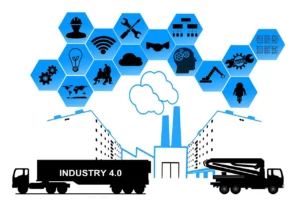The world has witnessed three industrial revolutions, with each binging in challenges of adopting new production methods. The First Industrial Revolution began in the 18th century that involved the mechanisation of production. The second, which also came to be known as the Technological Revolution, involved the use of telephonic communications, and electrical & steam power. With the third industrial revolution, the world witnessed the spread of automation and digitization through the use of electronics and computers, and the invention of the internet.
The Fourth Industrial Revolution involves human-machine interaction and the use of embedded Internet of Things (IoT) based sensors to drive data-based decisions. Industry 4.0 is revolutionizing the way companies manufacture, improve, and distribute their products and services. Manufacturers are integrating new technologies, including cloud computing and analytics, AI and machine learning, and the Internet of Things into their production facilities and throughout their operations to make manufacturing more agile, flexible, and responsive to customers.
The manufacturing industry is realizing the importance of developing smart factories equipped with advanced sensors, embedded software and robotics that collect and analyze data and allow for better decision making.
Let’s first take a quick look at the technologies that are driving industry 4.0:

-
Internet of Things (IoT)
The global IoT in the Manufacturing Market Industry growth is projected to reach USD 87.9 billion by 2026. IoT is becoming a key component of smart factories. IoT technology enables the flow of data and provides the ability to monitor and manage processes remotely and change production plans, when needed, in real-time. Moreover, it also improves manufacturing outcomes, speeds production, reduces waste, and improves the quality of goods produced.
-
AI and Machine Learning
AI and Machine Learning are allowing Industry 4.0 to gain a foothold in businesses and on factory floors. AI permeates the entire Industry 4.0 ecosystem; an example of this can be the use of AI algorithms to optimize the supply chain of manufacturing operations and to help them better respond to, and anticipate, change in the market.
AI and machine learning can also create insights providing predictability and automation of operations and business processes. For example, Industrial machines are prone to breaking down during the production process. However, using data collected from these assets can help a business perform predictive maintenance based on the algorithms of machine learning, resulting in higher efficiency.
-
Cybersecurity
As the manufacturing industry continues to adopt Industry 4.0, it becomes an increasingly appealing target for attackers. Without strong protection, attackers can take advantage of systems for industrial espionage, IP leakage, intellectual property theft, or even production sabotage. The manufacturing sector, in order to protect itself against evolving threats, should adopt a risk-based security mindset and security-first approach to the deployment of new connected systems.
-
Cloud Computing
The full realization of smart manufacturing demands connectivity and integration of engineering, production, supply chain, sales and distribution, and service. Cloud makes that possible. Cloud platforms allow businesses to have access to the latest data, applications, and processes brought by the new technological era without having to overspend on building physical infrastructure for the same.
-
3D Printing
3D printing enables manufacturers to produce complex parts with speed. Prototypes designed using 3D technology are used in the R&D stage to fix design problems before mass production. Moreover, with the use of 3D printing, parts and products can be stored as design files in virtual inventories and printed on demand, thereby reducing both cost and transportation distances.
BENEFITS OF INDUSTRY 4.0 FOR BUSINESSES
-
Flexibility and Agility
It is easier to scale production up and down in a smart factory. It is also convenient to introduce new products to the production line as well as create opportunities.
-
Better Efficiency
Multiple areas of the production line will become more efficient due to Industry 4.0 related technologies. Some examples of improved efficiency include faster batch changeovers, automatic reporting, and automatic track and trace processes.
-
Improved Productivity & Better Management of Resources
Industry 4.0 technologies enable to produce more and faster while allocating the resources more cost-effectively and efficiently. The production lines experience less downtime because of enhanced machine monitoring and automated/semi-automated decision making.
-
Cost reduction
The use of Industry 4.0 technologies helps to achieve lower operating costs through better uses of resources, less wastage, less downtime, and reduced quality issues. It creates immediate cost savings by also powering predictive maintenance and mitigating disruptions.
FINAL WORDS
Industry 4.0 is going to dramatically increase the ability of mankind to create products, ship them worldwide, and improve the customer experience. It is not just about addressing the current pain points but also about building a stronger future-ready foundation for continuous and sustainable growth.




